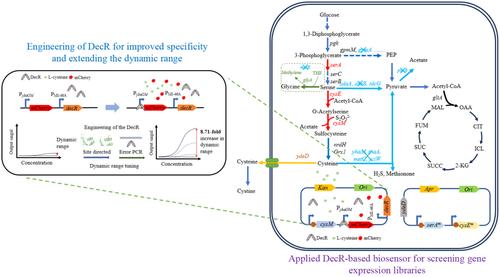当前位置:
X-MOL 学术
›
Biotechnol. Bioeng.
›
论文详情
Our official English website, www.x-mol.net, welcomes your feedback! (Note: you will need to create a separate account there.)
Engineering of the Lrp/AsnC-type transcriptional regulator DecR as a genetically encoded biosensor for multilevel optimization of L-cysteine biosynthesis pathway in Escherichia coli
Biotechnology and Bioengineering ( IF 3.5 ) Pub Date : 2024-04-18 , DOI: 10.1002/bit.28716 Zhiyou Zhou 1 , Zonglin Li 1 , Yahui Zhong 1 , Shuai Xu 1 , Zhimin Li 1, 2
Biotechnology and Bioengineering ( IF 3.5 ) Pub Date : 2024-04-18 , DOI: 10.1002/bit.28716 Zhiyou Zhou 1 , Zonglin Li 1 , Yahui Zhong 1 , Shuai Xu 1 , Zhimin Li 1, 2
Affiliation

|
L-cysteine is an important sulfur-containing amino acid being difficult to produce by microbial fermentation. Due to the lack of high-throughput screening methods, existing genetically engineered bacteria have been developed by simply optimizing the expression of L-cysteine-related genes one by one. To overcome this limitation, in this study, a biosensor-based approach for multilevel biosynthetic pathway optimization of L-cysteine from the DecR regulator variant of Escherichia coli was applied. Through protein engineering, we obtained the DecRN29Y/C81E/M90Q/M99E variant-based biosensor with improved specificity and an 8.71-fold increase in dynamic range. Using the developed biosensor, we performed high-throughput screening of the constructed promoter and RBS combination library, and successfully obtained the optimized strain, which resulted in a 6.29-fold increase in L-cysteine production. Molecular dynamics (MD) simulations and electrophoretic mobility shift analysis (EMSA) showed that the N29Y/C81E/M90Q/M99E variant had enhanced induction activity. This enhancement may be due to the increased binding of the variant to DNA in the presence of L-cysteine, which enhances transcriptional activation. Overall, our biosensor-based strategy provides a promising approach for optimizing biosynthetic pathways at multiple levels. The successful implementation of this strategy demonstrates its potential for screening improved recombinant strains.
中文翻译:

Lrp/AsnC 型转录调节因子 DecR 的工程化作为基因编码生物传感器,用于大肠杆菌 L-半胱氨酸生物合成途径的多级优化
L-半胱氨酸是一种重要的含硫氨基酸,难以通过微生物发酵生产。由于缺乏高通量的筛选方法,现有的基因工程菌都是通过简单地一一优化L-半胱氨酸相关基因的表达来开发的。为了克服这一限制,在本研究中,应用基于生物传感器的方法对大肠杆菌DecR 调节变体的 L-半胱氨酸进行多级生物合成途径优化。通过蛋白质工程,我们获得了基于 DecR N29Y/C81E/M90Q/M99E变体的生物传感器,其特异性得到改善,动态范围增加了 8.71 倍。利用开发的生物传感器,我们对构建的启动子和RBS组合文库进行了高通量筛选,成功获得了优化菌株,其L-半胱氨酸产量提高了6.29倍。分子动力学(MD)模拟和电泳迁移率变化分析(EMSA)表明N29Y/C81E/M90Q/M99E变体具有增强的诱导活性。这种增强可能是由于在 L-半胱氨酸存在的情况下变体与 DNA 的结合增加,从而增强了转录激活。总的来说,我们基于生物传感器的策略为在多个层面上优化生物合成途径提供了一种有前途的方法。该策略的成功实施证明了其筛选改良重组菌株的潜力。
更新日期:2024-04-18
中文翻译:

Lrp/AsnC 型转录调节因子 DecR 的工程化作为基因编码生物传感器,用于大肠杆菌 L-半胱氨酸生物合成途径的多级优化
L-半胱氨酸是一种重要的含硫氨基酸,难以通过微生物发酵生产。由于缺乏高通量的筛选方法,现有的基因工程菌都是通过简单地一一优化L-半胱氨酸相关基因的表达来开发的。为了克服这一限制,在本研究中,应用基于生物传感器的方法对大肠杆菌DecR 调节变体的 L-半胱氨酸进行多级生物合成途径优化。通过蛋白质工程,我们获得了基于 DecR N29Y/C81E/M90Q/M99E变体的生物传感器,其特异性得到改善,动态范围增加了 8.71 倍。利用开发的生物传感器,我们对构建的启动子和RBS组合文库进行了高通量筛选,成功获得了优化菌株,其L-半胱氨酸产量提高了6.29倍。分子动力学(MD)模拟和电泳迁移率变化分析(EMSA)表明N29Y/C81E/M90Q/M99E变体具有增强的诱导活性。这种增强可能是由于在 L-半胱氨酸存在的情况下变体与 DNA 的结合增加,从而增强了转录激活。总的来说,我们基于生物传感器的策略为在多个层面上优化生物合成途径提供了一种有前途的方法。该策略的成功实施证明了其筛选改良重组菌株的潜力。
















































 京公网安备 11010802027423号
京公网安备 11010802027423号